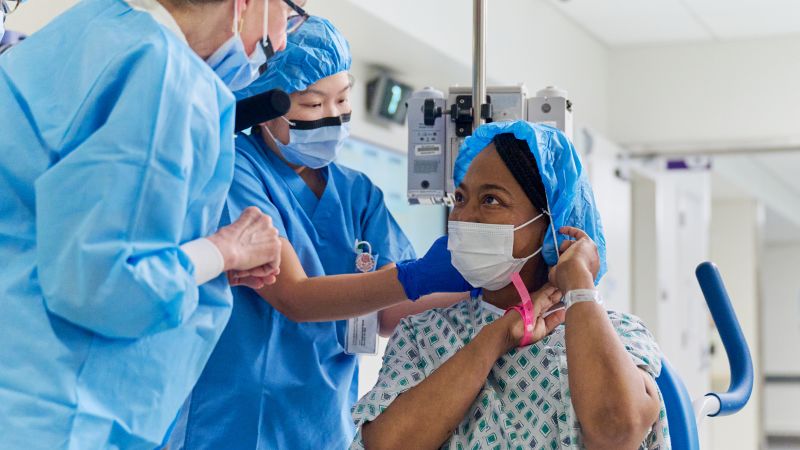In a groundbreaking medical achievement, Towana Looney emerges as the first person in the world to benefit from a functional pig kidney transplant. Doctors project that within the next decade, organ transplants from pigs to humans, such as Looney’s, may evolve into a common practice. This affirmation signals a promising future for patients requiring organ transplants, a dire necessity that many are currently unable to access due to the overwhelming shortage of human organs.
Looney, a 53-year-old resident of Alabama, underwent the innovative procedure at the NYU Langone Transplant Institute on November 25. Just eleven days post-transplantation, Looney exited the hospital, greeted by applause from the staff, as she triumphantly raised her thumbs in celebration while donning NYU Langone Health sweat attire and a mask. Her joyful exit illustrates not just a personal victory but a potential shift in the landscape of organ transplantation.
As news spread about Looney’s successful operation, her medical team expressed optimism regarding her recovery and the kidney’s performance. Presently, she stays in an apartment close to the hospital to facilitate daily checkups. An integrated team of doctors monitors her health through cutting-edge artificial intelligence and wearable technologies that continuously gauge her vital signs. This remarkable monitoring system is designed to detect potential health issues, such as infections, before they manifest into significant problems.
While she won’t be able to celebrate the upcoming holidays back home in Alabama, Looney’s healthcare team is hopeful that should her recovery proceed smoothly, she may return in approximately three months. Her eagerness to reconnect with her family and grandchildren illustrates a profound desire to reclaim a normal, fulfilling life.
Looney’s journey has been fraught with challenges. Before receiving the organ transplant, she was one of over 90,000 individuals on the US kidney transplant waiting list. Amidst numerous setbacks, her resilience is evident; she remarked, “There have been a lot of letdowns, but I don’t give up,” in a video distributed by NYU.
This wasn’t Looney’s first experience with organ donation. In 1999, she heroically donated a kidney to her mother. Unfortunately, due to a series of subsequent health complications, including preeclampsia during her pregnancy that caused damage to her remaining kidney, she found herself in a precarious position and required dialysis by 2016. Dialysis presents a short-term solution but operates at a fraction of the efficiency of a healthy kidney. With bleak statistics indicating that around 50% of individuals on dialysis face mortality within five years, the urgency for a kidney transplant for Looney escalated.
Looney joined the waiting list in 2017, but her situation was complicated by the fact that her body had developed a sensitization due to previous surgeries and blood transfusions. This made finding a compatible donor exceedingly difficult, leading her doctors to explore alternative options. It was then that Dr. Jayme Locke, a prominent figure in the field of xenotransplantation from the Heersink School of Medicine at the University of Alabama at Birmingham, introduced Looney to the revolutionary concept of utilizing pig kidneys for transplantation.
Locke’s pioneering work in genetically engineering pigs to produce organs for human transplantation provided Looney with a beacon of hope. She quickly agreed to participate in this experimental procedure, motivated by her desire to assist others in similar predicaments. The approach falls under the realm of “compassionate use,” permitted by the FDA for experimental therapies when conventional options prove inadequate.
The benefits of using pig organs are particularly compelling; their physiological similarities to human organs and rapid reproduction rates present a viable answer to the severe shortage faced by human organ transplantation. In her case, Looney became the third individual to receive a kidney from a gene-edited pig while alive, making history as the first recipient of a kidney with ten genetic modifications.
While previous recipients of pig kidneys did not have the same outcomes, Looney’s post-operative condition appeared more promising. Doctors heralded the surgery’s success, with her new kidney rapidly functioning upon attachment. This has granted Looney newfound vitality, bringing her closer to her aspiration of living without the grueling ordeal of dialysis.
Dr. Robert Montgomery, director of the NYU Langone Transplant Institute, expresses hope for the future of xenotransplantation, acknowledging the growing insights gained from each transplantation. He anticipates that, through continued compassionate use and clinical trials, the practice could become routine as early as 2033, which could dramatically alter the landscape of organ donation.
As Looney relishes the experience of living without the burdens of chronic kidney disease, she conveys her gratitude for the opportunity to contribute to a potential paradigm shift in organ transplantation. By taking this leap of faith, she not only sought to reclaim her health but also to pave the way for new solutions in a field that has historically been marked by demand and despair. Looney’s remarkable journey exemplifies hope in innovation, resilience in adversity, and a profound human spirit












